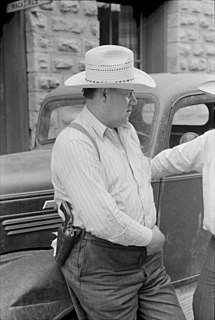Related Research Articles
The Uniform Crime Reporting (UCR) program compiles official data on crime in the United States, published by the Federal Bureau of Investigation (FBI). UCR is "a nationwide, cooperative statistical effort of nearly 18,000 city, university and college, county, state, tribal, and federal law enforcement agencies voluntarily reporting data on crimes brought to their attention".
A special agent is an investigator or detective for a governmental or independent agency, who primarily serves in criminal investigatory positions. Additionally, many federal and state special agents operate in "criminal intelligence" based roles as well. Within the U.S. federal law enforcement system, dozens of federal agencies employ federal law enforcement officers, each with different criteria pertaining to the use of the titles Special Agent and Agent.
Probation and Parole officers are officials appointed to investigate, report on, and supervise the conduct of convicted offenders on probation and/or those released from incarceration to community supervision such as parole. Most probation and parole officers are employed by the government of the jurisdiction in which they operate, although some are employed by private companies that provide contracted services to the government.
A law enforcement officer (LEO), or peace officer in North American English, is a public-sector employee whose duties primarily involve the enforcement of laws. The phrase can include police officers, prosecutors, municipal law enforcement officers, special police officers, customs officers, state troopers, special agents, secret agents, special investigators, border patrol officers, immigration officers, court officers, probation officers, parole officers, arson investigators, auxiliary officers, game wardens, sheriffs, constables, corrections, marshals, deputies, detention officers, correction officers, sworn campus police officers and public safety officers. Security guards are civilians and therefore not law enforcement officers, unless they have been granted powers to enforce particular laws, such as those accredited under a community safety accreditation scheme such as a security police officer.

A police academy is a training school for police recruits. It is also known as a law enforcement academy, college, or university. It involves a variety of background checks. These include examinations, physical requirements, medical requirements, legal training, driving skills, equipment training, and firearm training for law enforcement recruits. The academy prepares recruits for the law enforcement agency they will be assigned to upon graduation.

The California Department of Corrections and Rehabilitation (CDCR) is the penal law enforcement agency of the government of California responsible for the operation of the California state prison and parole systems. Its headquarters are in Sacramento.

The United States Department of Veterans Affairs Police is the uniformed law enforcement service of the U.S. Department of Veterans Affairs, responsible for the protection of the VA Medical Centers (VAMC) and other facilities such as Outpatient Clinics (OPC) and Community Based Outpatient Clinics (CBOC) operated by United States Department of Veterans Affairs and its subsidiary components of the Veterans Health Administration (VHA) as well as the National Cemetery Administration (NCA) and the Veterans Benefits Administration (VBA) respectively. The VA Police have several divisions and operate separately but alongside the VA Law Enforcement Training Center under the umbrella of the Office of Security and Law Enforcement. The primary role of VA Police is to serve as a protective uniformed police force in order to deter and prevent crime, maintain order, and investigate crimes which may have occurred within the jurisdiction of the Department or its federal assets. Some cases are investigated in conjunction with Special Agents from the Office of the Inspector General.
The Law Enforcement Action Partnership (LEAP), formerly Law Enforcement Against Prohibition, is a U.S.-based 501(c)(3) nonprofit group of current and former police, judges, prosecutors, and other criminal justice professionals who use their expertise to advance drug policy and criminal justice solutions that enhance public safety. The organization is modeled after Vietnam Veterans Against the War. As of April 2017, they have more than 180 representatives around the world who speak on behalf of over 5,000 law enforcement members and 100,000 supporters.
Law enforcement in the United States is one of three major components of the criminal justice system of the United States, along with courts and corrections. Although each component operates semi-independently, the three collectively form a chain leading from an investigation of suspected criminal activity to the administration of criminal punishment.
Manitoba Justice, or the Department of Justice, is the provincial government department responsible for administering the Crown Law justice systems in the province of Manitoba.

The New Jersey State Parole Board is a governmental body in the U.S. State of New Jersey that is responsible for assisting offenders to reenter society as law-abiding residents. To improve the safety of the public and the quality of life in New Jersey by administering an innovative parole system that addresses the needs of the community, victims, and offenders through a responsible decision-making process that provides every available opportunity for successful offender reintegration.

In the United States, a sheriff is an official in a county or independent city responsible for keeping the peace and enforcing the law. Unlike most officials in law enforcement in the United States, sheriffs are usually elected, although some states have laws requiring certain law enforcement qualifications of candidates. Elected sheriffs are accountable directly to the citizens of their county, the constitution of their state, and ultimately the United States Constitution.

The Cook County Sheriff's Office is the principal law enforcement agency that serves Cook County, Illinois. It is the second largest sheriff's department in the United States, with over 6,900 members when at full operational strength. It is headed by the Cook County Sheriff, currently Thomas Dart.

The Florida Department of Law Enforcement (FDLE) is a state-wide investigative law enforcement agency within the state of Florida. The department formally coordinates eight boards, councils, and commissions. FDLE's duties, responsibilities and procedures are mandated through Chapter 943, Florida Statutes, and Chapter 11, Florida Administrative Code. FDLE is headed by a commissioner who reports to the Florida Cabinet, which is composed of the governor, the attorney general, the chief financial officer and the commissioner of agriculture. The commissioner is appointed to his position by the governor and cabinet and confirmed by the Florida Senate.

In the United States, the state police is a police body unique to each U.S. state, having statewide authority to conduct law enforcement activities and criminal investigations. In general, state police officers, known as state troopers, perform functions that do not fall within the jurisdiction of the county sheriff, such as enforcing traffic laws on state highways and interstate expressways, overseeing the security of the state capitol complex, protecting the governor, training new officers for local police forces too small to operate an academy and providing technological and scientific services. They support local police and help to coordinate multi-jurisdictional task force activity in serious or complicated cases in those states that grant full police powers statewide.

The Bureau of Indian Affairs Police, Office of Justice Services, also known as BIA Police, is the law enforcement arm of the United States Bureau of Indian Affairs. The BIA's official mission is to "uphold the constitutional sovereignty of the Federally recognized Tribes and preserve peace within Indian country". It provides police, investigative, corrections, technical assistance, and court services across the over 567 registered Indian tribes and reservations, especially those lacking their own police force; additionally, it oversees tribal police organizations. BIA services are provided through the Office of Justice Services Division of Law Enforcement.

EUPOL Afghanistan (2007-2016) was a European Union mission supporting the reform efforts of the Afghan government in building a civilian police service in Afghanistan.
In the United States, certification and licensure requirements for law enforcement officers vary significantly from state to state. Policing in the United States is highly fragmented, and there are no national minimum standards for licensing police officers in the U.S. Researchers say police are given far more training on use of firearms than on de-escalating provocative situations. On average, US officers spend around 21 weeks training before they are qualified to go on patrol, which is far less than in most other developed countries.
The history of law enforcement in the United States includes many efforts at police reform. Early efforts at police reform often involved external commissions, such as the Wickersham Commission, that spelled out reforms but left to the police to implement them, often with limited success.
References
- 1 2 3 "Illinois Law Enforcement Training and Standards Board". ptb.illinois.gov. State of Illinois. 2022. Retrieved January 9, 2022.
- ↑ Kinnicutt, Grace (January 7, 2022). "Lawmakers pass second follow-up measure to last year's criminal justice reform". Capitol News Illinois. Springfield, Illinois . Retrieved January 9, 2022.